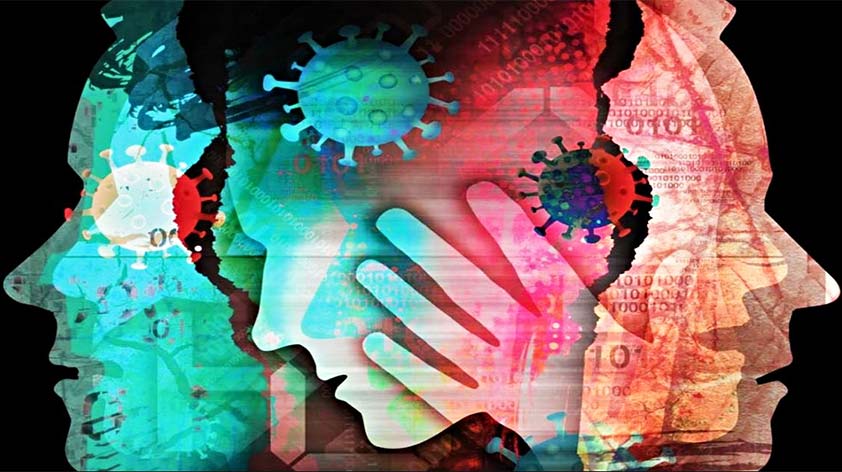
Anxiety, depression, and other mental health difficulties have increased globally as a result of the COVID-19 epidemic. Subsyndromal mental health disorders are a typical reaction to the whole pandemic. Since the end of year 2021, we’ve been seeing an increase in COVID cases owing to the Omicron strain, putting our resilience and capacity to handle stress to the test once more.
COVID-19-related psychological suffering is also prevalent in certain demographics. For example, family stress, social isolation, as well as disrupted schooling and anxiety about their futures can heighten emotional challenges in children and adolescents. These are important times in their emotional development.
In 2022, We are still likely to face many difficulties. People are worried about the virus’s acute health effects and the ramifications of physical seclusion. They are terrified of contracting an infection, dying, or losing family members. They have been physically separated from their loved ones and peers. Therefore, the number and severity of mental health problems are likely to continue to grow this year. Follow on for Mental Health: Top 5 Trends for 2022!
1. Stress & Anxiety
Both stress and anxiety are emotional responses, but stress is usually triggered by something outside of one’s control. Short-term factors, such as a job deadline, or long-term causes, such as being unable to work and chronic sickness, are all possible factors.
However, anxiety is described by persistent, overwhelming concerns that linger even when no stressor is present. The majority of individuals suffer stress and anxiety at some point in their lives.
But if stress and anxiety start to interfere with your everyday life, it might be a sign of a more serious problem. For example, insomnia, difficulty concentrating, fatigue, muscle tension, and irritability could be caused by that. Also, long term anxiety increases the chance of depression.
2. Depression
Depression is defined by a depressed mood and reluctance to act. Medically, it is defined as a mental and behavioural disorder.
Depression produces unhappiness and/or a loss of interest in previously appreciated activities. It can cause a slew of mental and physical issues, as well as a reduction in your capacity to operate at work and home.
Depressive disorders are among the most common triggers for a person who commits suicide. It is an involuntary sickness, similar to cancer or diabetes, but it is a curable condition that can be treated.
3. Trauma
Trauma is an emotional reaction to a traumatic incident such as an accident, natural disaster or the passing of a loved one. Shock and denial are common reactions right after an occurrence.
Unpredictable emotions, memories, strained relationships, and even physical symptoms like headaches or nausea are all long-term effects. It can also make you feel numb, distant, and untrustworthy of others.
4. Touch Starvation
A syndrome known as “Touch Starvation” or “Touch Deprivation” developed because physical contact was restricted during the covid 19 outbreak. Some could equate it to the craving for food when you’re hungry. It is a condition that people desire for physical interaction when they are unable to access others for a while.
Touch is vital for people when it comes to transmitting emotions and maintaining relationships. You might get agitated, nervous, or depressed if you don’t get enough physical touch.
Your body produces the hormone, cortisol in reaction to stress, which can raise your heart rate, blood pressure, muscular tension, and breathing rate, affecting your immunological and digestive systems negatively.
Doctors advise mothers to hold and soothe their newborns frequently to encourage healthy growth from infant time. The influence of touching contact can help you sleep better, eat better, improve your immune system, and fight illnesses even into adulthood.
5. Teen Mental Health
People of various ages have been affected by COVID-19 problem, but teens have been particularly hard hit. Adolescents rely on their friendships to preserve their self-esteem and cope with worry and sadness.
However, they have been relegated to a life of screens, alone, and uncertainty, rather than going to class and hanging out with friends. They’ve been cut off from their support networks due to school closures and social isolation.
Anxiety and despair are more likely to occur during the pandemic. A research amplified the voices of 8,444 teenagers and young people aged from 13 to 29, 27% of the participants reported feeling anxious and 15% reported feeling depressed during the pandemic.
In conclusion, good mental health is essential to a society’s functioning well. This catastrophe has had a significant influence on the mental health and well-being of entire societies, and it is a priority that must be addressed immediately. The good news is that we’ll be able to accommodate much better with the widespread vaccinations, feel more empowered, and increase confidence in 2022.
What are your ideas about improving mental health and what are your health expectations this year? Let us know in the comments below, and join in the conversation on Facebook, Twitter & Instagram!









